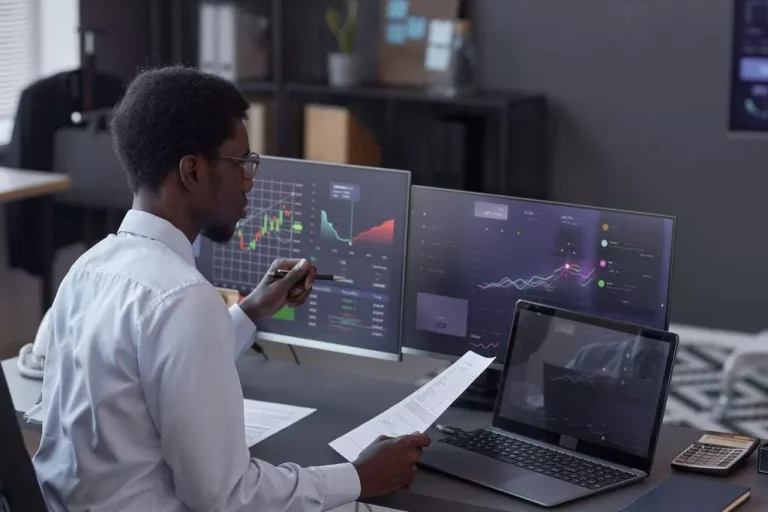To handle these points, regulatory our bodies worldwide, including SEBI in India, introduced direct market access. IFSCA is introducing sponsored access in India, a move anticipated to draw more buyers to explore buying and selling alternatives within the by-product phase. However, to ensure threat administration and mitigation, orders routed by way of clients’ trading purposes through SA should move through the pre-trade risk-management layer provided by the inventory exchange. Parameters for these risk- management controls are determined and configured by the broker-dealer registered with IFSCA and authorised to provide SA amenities. Before extending the SA facility, broker-dealers should enter into agreements with investors and undertake due diligence.
Institutional investors utilizing program trading can take benefit Direct Market Access of price discrepancies that final for under fractions of seconds.
By utilizing a co-location server, traders can cut back the time it takes for his or her orders to be transmitted to the change, potentially allowing them to get a better worth on their trades. Direct market entry (DMA) and co-location servers are two various varieties of trading techniques which might be used to facilitate the execution of trades. To use DMA, merchants will must have a buying and selling account with a DMA-enabled broker, in addition to a depository participant account and a clearing member account. They must additionally meet sure eligibility criteria and full the mandatory documentation. Institutions providing DMA companies should be registered with SEBI as trading members of the related trade. Overall, DMA can be a useful gizmo for traders who’re in search of extra management over the execution of their trades and who’re keen to tackle the extra threat administration responsibilities that it entails.
Direct Market Entry To Institutional Traders
They have to set trading limits, exposure limits, and place limits for all DMA clients based mostly on danger evaluation, credit quality, and obtainable margins. Compliance Officer overseeing compliance or risk-management features, such as the Chief Risk Officer or Chief Compliance Officer, are liable for setting these limits. Before granting DMA entry, stockbrokers must ensure that clients fulfil know your customer (KYC) and anti-money laundering (AML) necessities.
- Both SEBI and IFSCA mandate that stockbrokers maintain an audit path for all DMA orders and trades.
- Before extending the SA facility, broker-dealers must enter into agreements with buyers and undertake due diligence.
- They have to set trading limits, exposure limits, and position limits for all DMA purchasers based on danger evaluation, credit score high quality, and available margins.
- One key difference between DMA and co-location servers is that DMA allows traders to have direct access to the exchange’s order guide, while co-location servers simply velocity up the transmission of orders to the exchange.
- Institutions offering DMA companies have to be registered with SEBI as trading members of the related trade.
These third-party hyperlinks are offered solely for the aim of debate and thinking on Indian company regulation and other related subjects. It can also be attainable that a variety of the pages linked might turn out to be inactive after the lapse of a time frame. This will, after all, be subject to essential amendments to byelaws and laws of the inventory exchanges. You wouldn’t find your dealer operating ahead of you to purchase or promote when he involves know about your huge orders. Your dealer would, actually, not even know which shares you’re presently picking or which shares you may be at present dumping.
The introduction of sponsored entry by IFSCA is a pivotal growth that demands close examination and presents significant studying alternatives. When seamlessly and efficiently applied, this facility has the potential to place IFSCA as a global securities buying and selling hub and reshape the Indian securities market forever. The democratisation of order placement, increased transparency, and improved risk management will profit investors and contribute to the expansion and evolution of the securities market. SA services empower traders to transmit orders directly to the buying and selling system of the stock change without routing them through stockbrokers. SA not solely maintains the confidentiality of clients’ subtle proprietary trading methods but additionally reduces latency in trading. Stockbrokers themselves should implement certain checks earlier than offering DMA facilities to their clients.
It is essential for traders to fastidiously consider the professionals and cons of DMA earlier than deciding whether or not it is the right alternative for their wants. One benefit of DMA in India is that it permits merchants to entry the full depth of the market, somewhat than simply the top of the book as is the case with another forms of trading methods. This could be significantly helpful for merchants who are wanting to execute massive orders or who need to commerce a excessive quantity of shares. The contributors of this weblog haven’t reviewed all the data on these sites or the accuracy or reliability of any information, data, opinions, recommendation, or statements on these sites.
Indian Households Are Investing Extra In Shares Than It Could Appear
DMA is a system that permits merchants to put orders directly into the exchange’s order book, bypassing the necessity for a broker or different intermediary. This provides merchants extra management over the execution of their trades and doubtlessly allows them to realize higher prices. To ensure systemic threat mitigation, IFSCA allows purchasers of broker-dealers to sub-delegate their DMA/SA services to their own clients (sub-delegates). This is permitted if the sub-delegating consumer is an entity regulated by a securities market regulator that is a signatory to the International Organisation of Securities Commissions (IOSCO) multilateral memorandum of understanding (MoU). However, just one level of sub-delegation is allowed, and the broker-dealer permitting sub-delegation must be succesful of establish the different order flows originating from such sub-delegations.
Stock exchanges are answerable for verifying the presence of the agreement between the broker-dealer and the shopper before approving the SA facility. Direct Market Access (DMA) is a facility which allows Members to supply their purchasers direct access to the trade buying and selling system via their Computer to Computer Link (CTCL) infrastructure without manual intervention by them. DMA facility is currently permitted by SEBI only to institutional shoppers and further prolonged to investment managers. Such institutional clients might use the providers of an investment manager or advisor or portfolio manager («Investment Manager») to avail the DMA facility, as mentioned in the SEBI circular.

Our high-speed infrastructure and customised trading solutions assist you to seize fleeting market opportunities. Once you call your dealer for placing an order, your dealer has to manually place your order into the trading system of the inventory trade via his trading terminal. Because traders have direct entry to the exchange’s order book, they are responsible for managing the chance of their trades, including guaranteeing that they have adequate collateral to cowl any potential losses.
Saregama: A New Tune Another Time?
One key difference between DMA and co-location servers is that DMA permits traders to have direct entry to the exchange’s order book, whereas co-location servers merely velocity up the transmission of orders to the trade. DMA also typically requires merchants to have a direct buying and selling account with the trade, while co-location servers can be utilized by any trader who is prepared to pay for the service. In other words, even online buying and selling requires some type of intervention by your dealer on the finish and therefore it’d take some time before your order is actually placed within the buying and selling system of the inventory trade. Co-location servers, on the opposite hand, are high-speed computers that are located bodily close to the exchange’s servers.

These encompass threat management, risk mitigation, technology and techniques audit policies, consumer eligibility for DMA amenities, cybersecurity, cyber resilience, access control, and incident response. Earlier, all buying and selling used to happen by bodily interaction amongst brokers on the trading ground of inventory https://www.xcritical.in/ exchanges. Our stock exchanges—National Stock Exchange and Bombay Stock Exchange—use electronic trading techniques which routinely match the best buy order with one of the best promote order, with out consumers and sellers or their brokers truly coming in touch with each other.
Creditworthiness, risk-taking capacity, and compliance track data are also evaluated. Stockbrokers have to be glad with the client’s governance and possession structure and their ability to fulfill monetary obligations. Additionally, stockbrokers and clients must enter into agreements that define the terms of DMA utilization, including restrictions on executing transactions on behalf of other individuals or entities. Clients should comply with abide by the assorted limits imposed by the stockbroker for DMA utilization, and the stockbroker retains the proper to withdraw DMA services primarily based on predefined thresholds or different considerations instructed by the inventory change or regulator. Time was when buying and selling at stock exchanges used to seem like a shouting match in a fish market.
Scc Instances
Now all that continues to be is the press of the mouse, with only a few face-to-face interactions together with your broker. Things are certain to turn out to be much more user-friendly for institutional buyers with the introduction of what we call direct market access. While DMA enables traders to immediately entry stock change trading techniques, they are still certain to using the stockbroker’s buying and selling system. This arrangement raises considerations as stockbrokers can potentially achieve access to confidential and proprietary buying and selling strategies employed by buyers. Operational flexibility is granted to stock exchanges to ascertain essential measures, procedures, and tips for DMA orders.
Qatar Securities Co (p Q S C)
You are placing your order immediately in the electronic buying and selling system of the stock trade; this curtails any lack of time in calling your dealer. Better nonetheless, DMA additionally allows you to use what is recognized as algorithm trading or program trading during which laptop packages take choices of shopping for and selling in break up seconds without waiting on your command. Direct market entry (DMA) is a trading system that allows traders to place orders instantly into the exchange’s order book, bypassing the necessity for a broker or other middleman. This allows traders to have more control over the execution of their trades and doubtlessly obtain better costs. As a leading brokerage firm in Qatar, we provide sophisticated traders direct control over order entry and execution.
The Eu Is Planning Clear Emission-capture Norms For Its Carbon Market
DMA is a facility that permits stockbrokers to supply their shoppers direct entry to the trading system of the stock change, bypassing guide intervention. By utilising the stockbroker’s trading systems, direct access reduces latency and ensures sooner trade execution. Moreover, it enhances transparency and minimises the chance of errors inherent in handbook order placement. Both SEBI and IFSCA mandate that stockbrokers preserve an audit path for all DMA orders and trades. Stockbrokers are responsible for implementing techniques that may identify the actual consumer IDs for all DMA transactions. As stock buying and selling underwent digitisation and shares grew to become dematerialised, stock exchanges replaced bodily trading with online terminals for stockbrokers.

